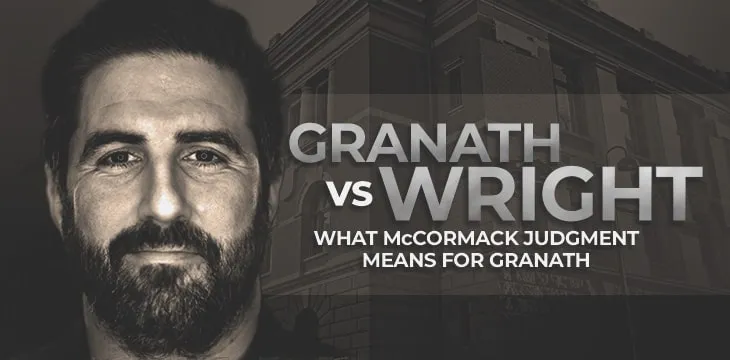|
Getting your Trinity Audio player ready...
|
Last month, the English High Court found that blogger Peter McCormack is liable for defamation over a series of tweets he had made calling Dr. Craig Wright a fraud in his claim to be Satoshi Nakamoto. In a few days, Dr. Wright will head to Norway to fight the same war on another front: this time against Twitter user Hodlonaut—real name Marcus Granath—who has embarked on a similar campaign of denigration against Wright.
Given Dr. Wright’s success in the English courts, what can the outcome in McCormack tell us about how this month’s Granath trial will go down?
Wright’s victory against McCormack doesn’t bode well for Granath
Though there are important distinctions between the case being tried in Norway on September 12 and the now-resolved McCormack suit, it should be said before anything else that Dr. Wright successfully made out the entirety of his case in the English courts regarding tweets that are practically identical to those made by Granath. There, the court agreed that all of Peter McCormack’s publications included in Dr. Wright’s lawsuit were defamatory at law, had caused serious harm to Dr. Wright’s reputation and that McCormack had failed to establish any defence which might save him.
Aforementioned distinctions aside, the McCormack suit will be a red flag for Granath as he prepares to go to trial on September 12. That the Judge in McCormack saw fit to reduce Wright’s damages to £1 will offer Hodlonaut no comfort: that reduction was subsequent to a finding in favor of Dr. Wright on his actual case against McCormack, and was done on the basis that Wright was at one point set to rely on evidence that later turned out to be allegedly untrue (though that evidence was abandoned by Wright before the case reached trial).
Not that it matters. If there was any question that the recovery of damages has never been the point of Dr. Wright’s portfolio of outstanding litigation, his claim against Granath in Norway holds the answer: Wright is asking for a relatively paltry sum of 100,000 NOK in damages (about £8.5k), instead focusing on the vindication of Wright’s reputation in the face of the targeted campaign of harassment that had been inspired against him. In the English case against McCormack, Wright similarly focused his submissions on securing an order preventing the blogger from repeating his defamatory statements—a decision on which is still pending.
For Wright, it isn’t about the money, just as his successful copyright claim over the Bitcoin white paper wasn’t about any money: it’s about his reputation and the protection of his own legacy.
How will the Granath trial be any different?
Nevertheless, despite being concerned with substantially the same question—whether the tweets calling Wright a fraud are defamatory—the lawsuits will chart significantly different courses to get an answer. This is partly due to the unique procedural histories of the Granath and McCormack lawsuits, and partly due to the differences in defamation law between England and Norway.
First off, the Norwegian lawsuit was launched by Granath, making Dr. Wright the defendant. Granath went to the Oslo court seeking a declaration that the tweets he had made against Dr. Wright were not defamatory, in an attempt to avoid meeting Wright in the English courts (a shrewd attempt in hindsight, given the outcome of McCormack), relying on EU law which prevents European courts from accepting jurisdiction over cases which are already subject to the same proceedings elsewhere. This attempt failed, and Granath must now meet Dr. Wright’s defamation claims in both England and Norway.
The unusual lead-up to the McCormack trial is also going to account for meaningful differences in how the cases are argued. Before trial, McCormack famously announced that he would be unable to defend Dr. Wright’s case against him due to his funders—the beleaguered Tether—withdrawing their financial support. The timing of this withdrawal is notable, because it took place immediately following discovery, in which both parties exchanged their evidence in the case—including ‘crazy’ amounts of evidence that Dr. Wright is Bitcoin’s inventor. When McCormack eventually revived his defence at the eleventh hour, he had dropped his ‘truth’ defense (that his tweets were true) entirely.
The upcoming trial in Norway will be much different. Again, the law on defamation in Norway is such that the truth of Granath’s statements—that Dr. Wright is a fraud—will be a key factor in the court’s ultimate determination. But more than that, unlike McCormack, Granath appears to have no concerns about wasting money on a hopeless case: just last week, the Twitter user revealed that he had received an anonymous payment of 47 BTC—almost US$1 million—in a single donation, adding to the 2,000 plus donors who have already contributed to Granath’s legal defense, not to mention his taxable income. Unlike McCormack, trying to convince the court that Dr. Craig Wright is in fact a conman is something Granath can afford to do, because no one entity is paying for it.
However, under the regime governing Norwegian defamation claims (s 3-6A of the Tort Act), the case will not be resolved by Granath’s simply demonstrating that one or another of his statements are true. Even if Granath can somehow show that a given statement is true, the court will also look at other factors, such as the manner in which the statement was made or the nature of the person making the statement, when deciding whether the statement was unlawful.
In filings made earlier this week, Dr. Wright’s lawyers honed in on several factors in Granath’s tweeting spree to support their contention that Granath’s statements were unlawful. They highlighted the fact that many of Granath’s tweets were couched in deeply personal language; for instance, calling Dr. Wright ‘mentally ill’—a particularly distasteful characterization of Wright given that he has been open about having Asperger’s Syndrome. The filings also point out that (unlike McCormack) Granath began his anti-Wright Twitter campaign from behind an anonymous Twitter account. In other words, there can be no claim from Granath that his statements were a journalistic exercise or in the spirit of open debate: his attacks on Dr. Wright’s reputation as a public figure were wholly asymmetrical in that respect.
The filings also contain another timely point: Granath’s affiliation with Wright’s direct commercial competitors via his Lightning Torch project. The project was started by Granath as a way to demonstrate the success of BTC’s Lightning Network, which gives users of BTC and other assets the ability to make ‘fast and cheap’ payments on BTC’s second layer. Given that Wright invented the Bitcoin which offers this exact functionality out-of-the-box, Wright is a natural target for Granath and his affiliates, because for them, his success is an existential threat.
Commercially motivated attacks have become a fact of life for Dr. Wright. In fact, a bombshell exposé recently revealed that Roche Freedman, the law firm responsible for last year’s Bitcoin Billions lawsuit against Dr. Wright, may have filed the suit as part of a strategy to subdue competitor digital asset companies in favour of companies like Ava Labs, a blockchain company in which the firm has close commercial ties. Ava Labs itself if founded by Emin Gün Sirer, who the expose accuses of having a personal vendetta against Dr. Wright.
The verdict?
That Wright came away from Wright v McCormack with a total victory has been obscured somewhat by chatter around his award of damages, but the fact remains: the English court agreed with Dr. Wright that Peter McCormack’s tweets—calling Wright a fraud—were legally defamatory and had in fact caused serious harm to Dr. Wright’s reputation. Any analysis of the upcoming Granath trial—at least insofar as it relates to McCormack—must start there.
And yet, Norwegian law is such that the question of whether Granath’s tweets were unlawful will be far more involved. Yes, parties will get the chance to argue over the truth of Granath’s statements, but the court will also be looking at the context in which they were made. Can an individual’s right to privacy be abrogated by a totally anonymous individual deciding to launch scathing personal attacks upon them, while encouraging others to do the same? Is there more to Granath’s attacks on Dr. Wright, as was the case with Roche Freedman’s billion dollar suit from last year?
Ultimately, September 12 will mark the beginning of a far more comprehensive defamation trial than McCormack’s turned out to be. Dr. Wright has been outspoken about his desire for exactly that and appears ready to face Granath under those conditions. Can the same be said for his opponent?
CoinGeek will be in Oslo to cover the seven-day trial, beginning September 12.

 06-20-2025
06-20-2025 





